Zinziberis Siccum, Dry Ginger, Gan Jiang 干姜Gan Jiang (TCM)Shunthi (Ayurveda) Chuku (Siddha) Zanjabil, Zanjabeel Khushk (Unani) Sman Sga སྨན་སྒ (Tibetan) |

|
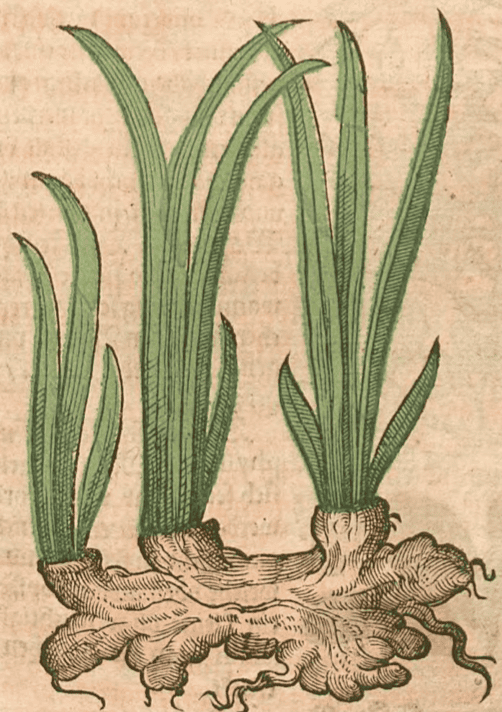 Krauterbuch, Lonitzer, 1578
Krauterbuch, Lonitzer, 1578 |
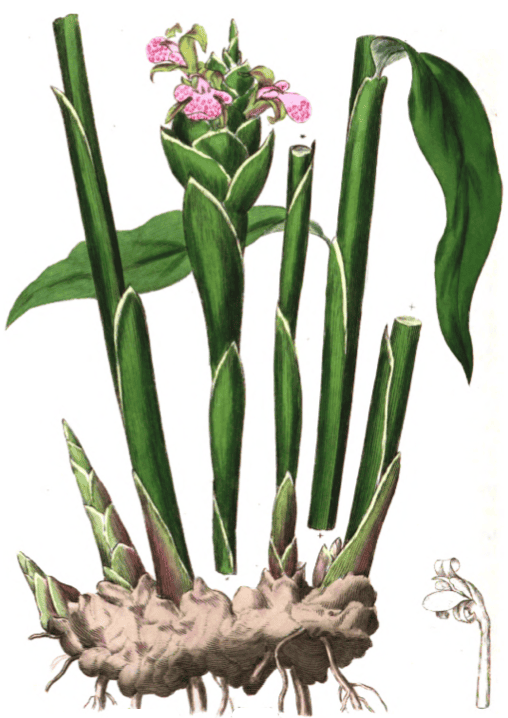 Medical Botany, Woodville, Hooker, 1832
Medical Botany, Woodville, Hooker, 1832 |
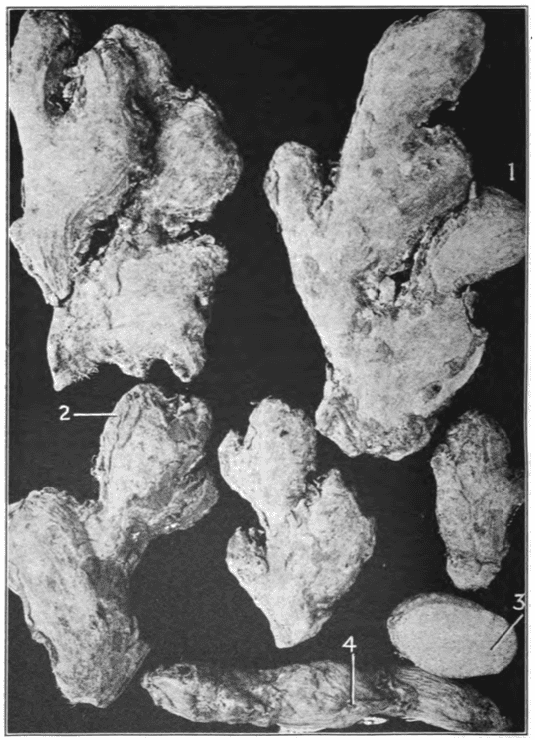 Chinese Ginger
Chinese Ginger |
 Culcutta Ginger
Culcutta Ginger |
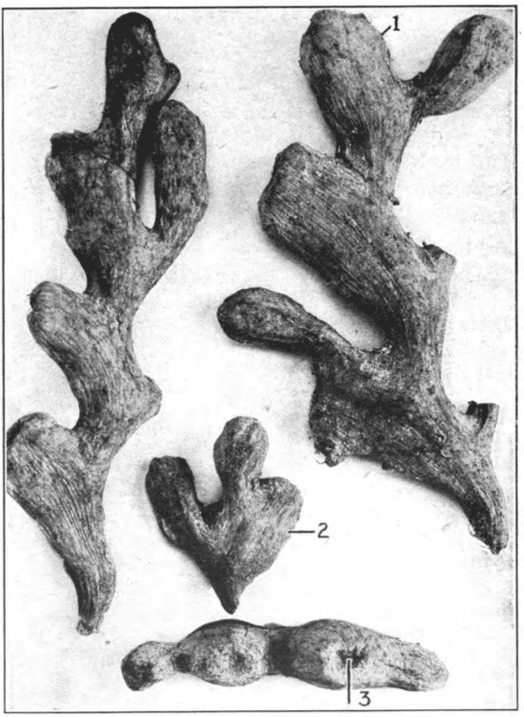 Jamaica Ginger
Jamaica Ginger |
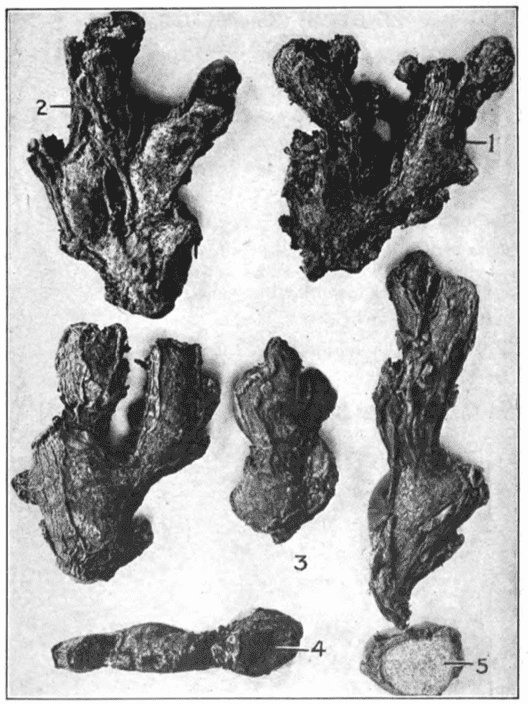 African Ginger
African Ginger |
 Members CLICK HERE for the PRO VERSION
Members CLICK HERE for the PRO VERSIONBotanical name:
Zingiber officinalis
Parts used:
Rhizome, fresh and dried
Temperature & Taste:
FRESH: Very Warm, dry. Pungent, Sweet.
DRY: Hot, dry. Pungent
Classifications:
2B ATTENUATER. 2F. PURIFYING. 2H. CARMINATIVE.
3F. LITHONTRIPTIC. 3H. LACTAGOGUE. 3L. ANTI-TUSSIVE. 3P. MASTICATORIES & STERNUTATORIES.
3K. EXPECTORANT
3I. APHRODISIAC. 3J. INCREASE SEMEN (candied Ginger)
4e. STOMACHIC. 4g. HEPATIC. 4h. NEPHRITIC
Uses:
1. Warms the Yang, Clears Cold: (West, TCM, Ayurveda, Tibetan)
-poor circulation due to coldness, or lack of body heat; coldness of the limbs, weak pulse
-poor circulation, chilblains, cramp, fibrositis and muscle strain.
-Amenorrhoea and Dysmenorrhea from cold
2. Warms the Stomach, Promotes Digestion: (West, TCM, Ayurveda, Tibetan)
-‘strengthens and fortifies the stomach’ (Galen)
-vomiting, diarrhea, abdominal pain, dyspepsia, flatulence, colic from Cold
-nausea from cold: motion sickness, morning sickness, nausea related to flus or virus, nausea from medication etc.
3. Warms the Lungs, Clears Cold Phlegm: (West, TCM, Ayurveda, Tibetan)
-Lung conditions from cold-type phlegm (TCM, West)
-Cough, Wheezing
4. Clears Wind and Phlegm, Clears the Sight:
-traditionally used for Headaches, Vertigo and Dizziness the latter 2 of which have been confirmed in modern trials.
-Paralysis, Sciatica, Migraine (Unani)
5. Clears Cold, Stops Bleeding: (TCM)
-chronic bleeding from coldness; pale face and tongue, weak and thin pulse, coldness of the limbs, blood is pale and thin looking.
-especially suitable for Uterine bleeding. (Burnt Ginger is most often used)
Dose:
Dry Ginger: in decoction: 3–9 grams;
Powder: 500mg–3 grams
Comment:
1. Fresh Ginger is more tempered in its Heat and works more superficially, promoting Sweat and clearing Cold from the surface of the body in Cold and Flu. It is also very good to promote digestion and enhance assimilation and is beneficially used in cooking for this purpose.
2. Dry Ginger is Hot and works deeper in the body, especially the Spleen and Kidneys. It warms the Yang and is stronger for Internal Cold.
3. Candied (or Conserved) Ginger is Warm and Sweet. It increases Yang and is useful for Impotence and is traditionally regarded as Aphrodisiac. It warms and strengthens a Cold Stomach.
4. Ginger Skin clears Water and is useful in Edema and Fluid retention from Cold and Damp.
5. Carbonised Ginger is more effective to stop Cold-type Bleeding, especially Uterine Bleeding.
6. In practice, the distinction between fresh and Dry Ginger is more prominent in TCM. For example, Ayurveda will commonly apply Dry Ginger to acute Cold and Flu and fresh or Candied Ginger can be used to Warm the Kidney Yang. Likewise TCM will prefer carbonised Ginger for Cold-type Bleeding but we can see evidence of Dry Ginger being used for this purpose without being carbonised.
Correctives:
… available in PRO version
Substitute:
… available in PRO version
Preparation:
… available in PRO version

Main Combinations:
1. Ginger Pills … available in PRO version
2. To regulate and strengthen the Stomach, for Nausea, Vomiting, stomach Pain, and to relieve side effects of toxic or hard-to-digest medicines, Ginger is often used with Chinese Red Dates (Da Zao).
3. Ginger is often combined with Long and/or Black Pepper; the three together form Trikatu (‘Three Pungents’) of Ayurveda. Used to clear cold, resolve Damp, promote digestion and increase assimilation and bio-availability. They are often added to formulas of Traditional Medicine.
4. Cold Phlegm:
i. Ginger with … available in PRO version
ii. Ginger with … available in PRO version
iii. Ginger with … available in PRO version
5. Cold Cough, Ginger with … available in PRO version
6. Fever, Indigestion, Diarrhea, Bronchitis, Ginger with … available in PRO version
7. Poor digestion, Nausea, Vomiting, Cough, Asthma, Ginger with … available in PRO version
8. Diarrhea:
i. Ginger with … available in PRO version
ii. Ginger with … available in PRO version
9. To warm and strengthen the Stomach:
i. Ginger with … available in PRO version
ii. Ginger with … available in PRO version
iii. Ginger with … available in PRO version
10. Poor appetite during Pregnancy, Ginger with … available in PRO version
11. Morning Sickness, fresh Ginger with … available in PRO version
12. Dizziness, Vertigo, Ginger with … available in PRO version
13. Arthritis:
i. Ginger with … available in PRO version
14. Dysmenorrhea, Ginger … available in PRO version
15. As a Diaphoretic, Ginger with … available in PRO version
16. Against Poison: Ginger with … available in PRO version
17. Scoliosis and crookedness of the Spine, Ginger … available in PRO version
Major Formulas:
Electuary of Ginger (Dia Zingiber) (Nicholas)
Powder of Turbith (Avicenna)
Compound of Turbith with Anise
Powder of Senna (Montagna)
Powder of Three Peppers (Diatrion Piperion) (Mesue)
The Powder of Trithemius
Powder for Melancholy (Philon)
Powder to Purge Phlegm (Unani)
Emperors Powder
Species Incisa (Augustine Pharmacopoeia)
Antidote for Wind and Cold (Nicholas)
Antidotum Augustini (Nicholas)
Electuary of Aloeswood of Avicenna
Li Zhong Wan
Powder of Clove (Ayurveda)
Powder of Camphor (Ayurveda)
Cardamon 10 (Sug smel bcu pa) (Tibetan Medicine)
Cautions:
1. Dry Ginger should be avoided in cases with Heat and Yin Deficiency.
Main Preparations used:
Candied Ginger, Green Ginger
